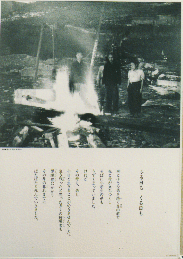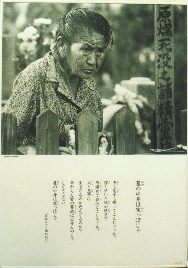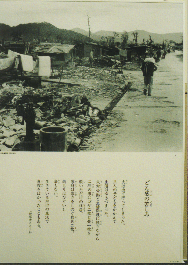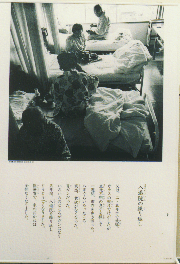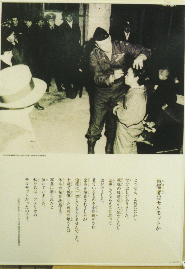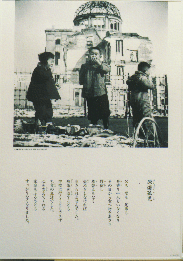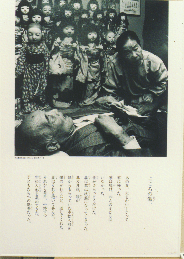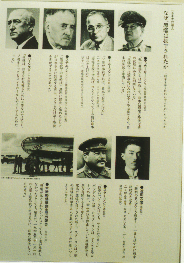| Suffering and Anger | ||
|---|---|---|
|
(21)For Days on End Motionless, my mother and I stood, and my little brother crouched, in
front of the fire in which we had burned my elder sister and other brother. Urakami-cho, Nagasaki |
(22)It's Empty Inside the Grave My husband and my son never returned. Even my daughter and myself fell
prey to atomic bomb disease, after looking for them. Photo: Chugoku Shimbun |
(23)Suffering in the Depths After the atomic bombing, my husband deserted us. Hiroshima |
|
(24)Repeated Hospitalization My father was exposed to the bomb at 2.5 kilometers from the epicenter. The Red Cross Hospital, Nagasaki |
(25)Are Hibakusha Guinea Pigs ? Without notice, I was called by the ABCC. I went there expecting to
be given medical treatment, because I was anxious about the after-effects
of the atomic bombing. I had to take off all of my clothes and was examined
from head to toe, but received no medical treatment. ABCC = Atomic Bomb Casualty Commission of the United States. The U.S.-Japan Joint Research Team on Atomic Bomb (later incorporated
into the ABCC) |
(26)Atomic Bomb Orphans With no father, no mother, no brothers and relatives to turn to Children eating snow, Hiroshima |
|
(27)The Trauma That day, we managed to get home through the fire. Yoshio and Motae Kuramitsu, Saitama |
(28)(Voices of the Leadership) Why Was the A-bomb Dropped? -- Was it "to end the war earlier?" (from the upper right to the lower left) Harry S.Truman (President of the US) -- "Fini Japs when that comes about." (His journal, on the first day of the Potsdam Conference, July 17, 1945) -- "(If we use the atomic bomb, IjBelieve the Japs will fold up before Russia comes in." (His journal of July 18, 1945 after he received the cable message which confirmed the success of the A-bomb test) Henry L. Stimson (US Secretary of War, Supreme Commander of the A-bomb operation) "It was to bring the Japanese surrender at the earliest possible date, before the Russians, who had already entered Manchuria, reached the mainland of Japan." James F. Byrnes (US Secretary of State) "(Mr. Byrnes) did not argue that it was necessary to use the bomb against ... Japan in order to win the war ...(His) view (was) that (it) would make Russia more manageable..." Fumimaro Konoe (Prime Minister of Japan) -- This is a war without prospect for victory ... I cordially recommend that the way be explored to conclude the war at the earliest possible date." (Report to the Emperor on February 14,1945. However, the Emperor's decision was delayed, and Japan surrendered after the dropping of the A-bombs) Joseph Stalin (Prime Minister of the Soviet Union) -- "At any cost, do it as soon as possible." Immediately after his return from Potsdam, Stalin ordered Foreign Minister V.M. Molotov to swiftly reopen the atomic weapon development program, which had been stopped since 1942. When the bomb was dropped on Hiroshima, Stalin gathered 5 leading scientists and ordered them to catch up with the United States. Report of the US Strategic Bombing Survey Team (1946) -- "Even if the bomb had not been dropped, and even if Russia had not entered the war, Japan would have certainly surrendered by the planned landing on Kyushu on November 1, 1945." Enola Gay, the plane that dropped the A-bomb on Hiroshima |
|
